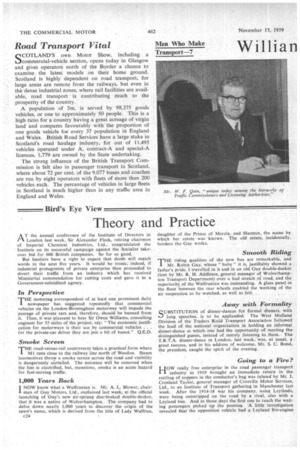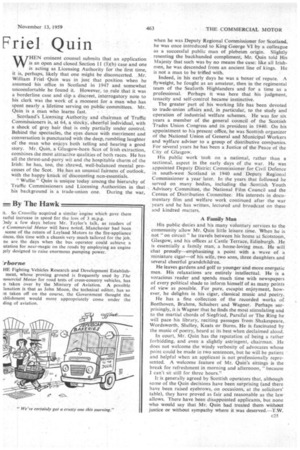Theory and Practice
Page 74

Page 75

If you've noticed an error in this article please click here to report it so we can fix it.
By The Hawk
AT the annual conference of the Institute of Directors in London last week, Sir Alexander Fleck, retiring chairman of Imperial Chemical Industries, Ltd., congratulated the Institute on its successful campaign against the Socialist takeover bid for 600 British companies. So far so good. But hauliers have a right to expect that deeds will match words in the next five years. It would be ironic, indeed, if industrial protagonists of private enterprise then proceeded to divert their traffic from an industry which has received Ministerial commendation for cutting costs and gave it to a Government-subsidized agency.
In Perspective . _
THE motoring correspondent of at least one prominent daily newspaper has suggested repeatedly that commercial vehicles on the London-Birmingham motorway will impede the passage of private cars and, therefore, should be banned from it. Thus, it was pleasant to hear Sir Owen Williams, consulting engineer for 55 miles of the project, say: "The economic justification for motorways is their use by commercial vehicles . for the private-car driver they are just a bit of bunce." Q.E.D.
Smoke Screen
THE road-versus-rail controversy takes a practical form where M1 runs close to the railway line north of Weedon. Steam locomotives throw a smoke screen across the road and visibility is dangerously curtailed. The nuisance will be removed when the line is electrified, but, meantime, smoke is an acute hazard• for fast-moving traffic.
1,000 Years Back
I NOW know what a Wulfrunian is, Mr. A. L. Blower, chair' man of Guy Motors, Ltd., explained last week, at the official launching of Guy's new air-sprung disc-braked double-decker, that it was a native of Wolverhampton. The company had to delve down nearly 1,000 years to discover the origin of the town's name, which is derived from the title of Lady Wulfrun, daughter of the Prince of Mercia, and Hamtun, the name by which her estate was known. The old estate, incidentally, borders the Guy works.
Smooth Riding
THE riding qualities of the new bus are remarkable, and Mr. Robin Guy, whose " baby " it is, justifiably showed a father's pride. I travelled in it and in an old Guy double-decker (lent by Mr. R. H. Addlesee, general manager of Wolverhampton Transport Department) over a bad stretch of road, and the superiority, of the Wulfrunian was outstanding. A glass panel in the floor between the rear wheels enabled the working of the air suspension to be watched, as well as felt.
Away with Formality
SUBSTITUTION of dinner-dances for formal dinners, with long speeches, is to be applauded. The West Midland Division of the Traders Redd Transport Association followed the lead of the national organization in holding an informal dinner-dance at which one had the opportunity of meeting the distinguished guests, instead of merely listening to them., The T.R.T.A. dinner-dance in London, last week, was, as usual, a great success, and in his address of welcome, Mr. S. C. Bond, the president, caught the spirit of the evening,
Going to a Fire?
HOW really free enterprise in the road passenger transport industry in 1919 brought an immediate return in -the rattling of coppers in the conductor's bag was related by Mr. J. Crosland Taylor, general' manager of Crosville Motor Services, Ltd., to an Institute of Transport gathering in Manchester last week. After the 1914-18 war his company, using Leylands, were being outstripped on the road by a rival, also with a Leyland bus. And in those days the first one to reach the waiting passengers picked up the pennies. A little investigation revealed that the opposition vehicle had a Leyland fire-engine
it. So Crosville acquired a similar engine which gave them iseful increase in speed for the loss of 3 m.p.g.
)nly a few days before Mr. Taylor's talk, as readers of e Commercial Motor will have noted, Manchester had been scene of the return of Leyland Motors to the fire-appliance illness, this time with a chassis very much tailored for the job. ne are the days when the bus operator could achieve a utation for near-magic on the roads by employing an engine ;ely designed to raise enormous pumping power.
:rborne
HE Fighting Vehicles Research and Development Establishment, whose proving ground is frequently used by The nniercial Motor for road tests of cross-country vehicles, has n taken over by the Ministry of Aviation. A possible lanation is that as John Moon, the technical editor, has so ;n taken off on the course, the Government thought the iblishment would more appropriately come under the ding of aviation.
































































































































































































































































